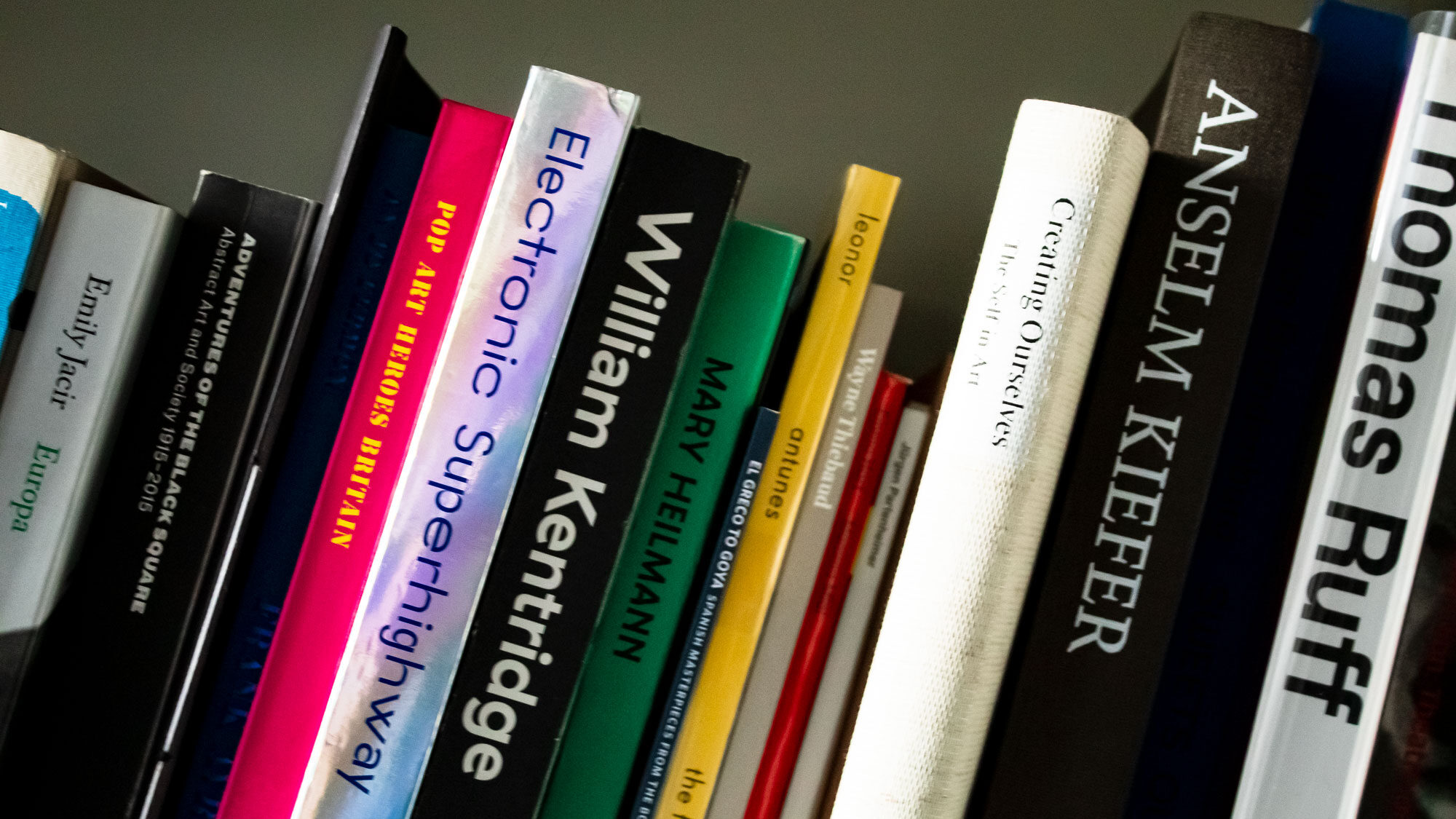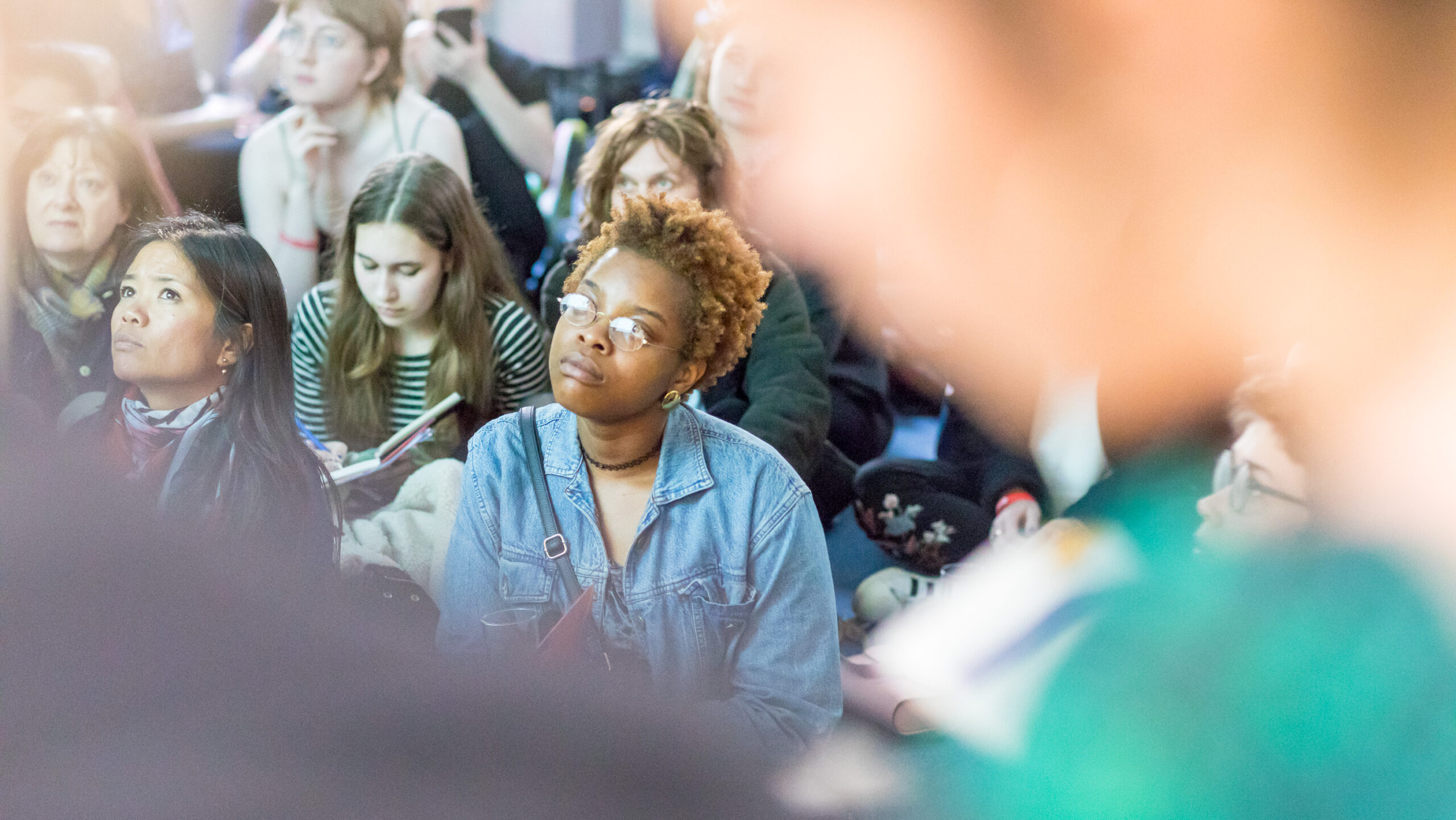What are The Courtauld's Decolonising Action Groups?
Many of our students and staff, from all disciplines and professions, are interested in learning more about the process and potential of decolonisation and how they can apply this learning to their work and lives, whatever their role within The Courtauld. Our Decolonising Action Groups comprise small groups of our students and staff who want to expand their understanding of decolonisation and put this to practical use. Groups are led by students and staff, with support from the Research Forum Programme Manager and Events Producer.
The groups originally met as reading groups; when it became clearer that ‘understanding’ goes hand-in-hand with ‘application’, the reading groups pivoted to action groups. We meet collectively to ensure accountability and support between participants, to hold the institution to account, and to draw on existing access to resources.
The work our groups develop, discuss, and implement is directly linked to The Courtauld’s foundational tenet that everyone should have the opportunity to engage with art. “The Courtauld works to increase understanding of the role played by art throughout history, in all societies and across all geographies – as well as being a champion for the importance of art in the present day.”
Although all work is voluntary, it is part of an effort within The Courtauld to create an equitable, diverse, and inclusive place to study, teach, and work. Courtauld Decolonising Action Groups are an example of the grassroots application of our shared mission, looking both at what can change immediately and, by involving a wide range of voices, be achieved with long term, structural change. The groups intend to create change from within.
Decolonisation work has been taking place at The Courtauld for some time, particularly with the expansion of faculty through new hires looking beyond the western canon of art, who are able to offer new programme opportunities for students. However, the reading groups arose out of our specific response to the murder of George Floyd, and that of the Black Lives Matter movement, in 2020. This has been seen as a turning point for many institutions, including The Courtauld.
What is Decolonisation?
Decolonisation is a complex issue that gives rise to different views and approaches. Even within the Decolonising Action Groups, we have different focuses and activities taking place.
Most of our groups began by reading the pioneering special edition of Art History, ‘Decolonizing Art History’ by Professor Dorothy Price and Dr Catherine Grant (both now faculty at The Courtauld). This introductory section, which is free to access, uses a questionnaire to draw on voices from different contexts, to look at how those engaged in decolonising art history approach the subject.
The Courtauld is a specialist in Art History, Curation, and Conservation, with a small student body, a strong research culture, and a faculty of experts in international cultural contexts, a very specific context within which to think about decolonisation. Drawing from Price and Grant’s questionnaire, we arrived at a definition of decolonising art history: Decolonisation is the radical reevaluation of the dominant cultural values by institutions that consider themselves to be the standard-bearers of collective cultural heritage. These dominant cultural values include the often obscured or justified histories of colonial violence and approaches to knowledge production that maintain inequality.
From this definition, our groups consider three things in particular: access, accountability, and exclusion. We don’t think about these topics solely from a perspective of race, religion, or ethnicity, but also think about how gender, disability, class, and education impact people’s lives.
‘Access’, for us, is about considering how we should provide greater access to power through education, decision making, funding and resourcing; we consider who holds power and what we can do to allow a wider range of voices to be involved in how The Courtauld functions and relates to the wider discipline.
‘Accountability’ is about acknowledging our position as a leader within the disciplines of Art History, Curation, and Conservation – including pioneering research into the culture, art, and heritage of formerly colonised and often overlooked countries, societies and communities – and as an established historical educational institution which needs to be held to account over decisions which affect those within our community and society at large.
‘Exclusion’ relates closely to access and accountability, in that we consider how structures might – intentionally or otherwise – exclude individuals or entire groups from participating in the disciplines of Art History, Curation and Conservation, and from having a platform to share explorations of their own cultural and artistic histories. We consider how this might weaken the discipline, our understanding of our collection, and our engagement with the world.
Our mission
As groups, we hope to achieve a number of things by applying decolonisation to the study and teaching of Art History, Conservation, and Curation, to our community relations, our power structures, and our collection and its public display. We hope to promote greater knowledge of postcolonial perspectives and to champion decolonising the narratives in our teaching, researching, exhibiting, programming, or other activities. By doing this, we hope to encourage future generations of academics, curators, conservators and critics to take this approach out into the world. We also intend to create within The Courtauld a strong community which celebrates the diversity within, not only from top-down, but by creating encouraging spaces for people to celebrate and share their own cultural background.
We will hold ourselves to account by reviewing our progress, and we commit to involve and support those members of our community who may be directly affected by colonial approaches to art history, curation, and conservation.
Our vision
To achieve these missions we want to shape The Courtauld. We understand that, as a world-leading institution, it can have enormous impact on other cultural spaces, and spaces of higher education, as well as the general public. To achieve this, we want The Courtauld to change the shape of art history and to challenge white privilege wherever it is encountered, by advocating for greater diversity and improved representation. This means not only encouraging those who have been excluded to be part of The Courtauld, but paving the way for them to actively shape it and to feel a sense of ownership over the institution. Through this, we can strengthen our community and create the opportunity for that community to be self-reflective and open to change and growth.
A key approach to achieving our vision will be to engage all students and staff in this process, not just colleagues or students from underrepresented or marginalised backgrounds, and not only those involved in teaching, research, or study. We need to integrate decolonisation into our approaches to teaching, recruiting, and building our curriculum and community. It is important that we work to bring our staff and student body together in order to create networks of support and care at every level and to create spaces for conversation. Equally, those who hold power or sit in positions of privilege cannot shy away from being challenged, meeting those challenges, and improving.
Our challenges and our potential
We are a small, specialised institution which also has a very public-facing gallery. Our size means that we have fewer resources overall, but we see great potential in getting a significant portion of our community involved in this work in some way; we already have engagement from faculty, all levels of the student body, and colleagues from research, visitor services, commercial, digitisation, library, and development departments.
There is significant work underway at The Courtauld around widening participation, which we feel is critical to applying decolonisation in that it reflects the approach of ‘nothing about us without us’[1]; a diverse academic population brings the potential for new voices and perspectives on issues which are not familiar to others within the institution.
The groups have also already discussed particular issues around the discipline of Art History, perceptions which might be held about it as an exclusive subject, particularly given the current lack of governmental support for Arts subjects and the lack of provision within further education. Historically, as with many other disciplines, the subject had a very fixed canon from a Western viewpoint. However, Art History is also a field where we have seen positively embrace decolonisation, particularly in areas such as exhibition, collections management, and community engagement. We want to be part of this movement!
———————————————————————————————————————————————————
[1] This phrase has been used since the 1990s, originating in the South African disability rights movement. It acknowledges the tendency for marginalised groups to be excluded from decision making about their own situation and seeks to recentre the voices of those most affected. Acknowledging the intersection of disability and decolonisation and the positive and empowering impact of this approach within disability activism, the Decolonising Action Groups will work with this approach to bring those voices which have typically been excluded to the fore of our action.
What do the current groups do?
Each group meets once per month to decide what activity to undertake, and everyone involved meets once per semester to check in.
Some of the things we are focused on include:
Student support: looking at how we can help students from marginalised backgrounds to study at The Courtauld, including by considering the application process, assisting those interested in attending (financially, with application writing, with access courses), and considering how to support these groups of students when they are part of our community. The groups are putting together ‘survival guides’ based on lived experience, working with our Widening Access staff and organising regular social events encouraging students to share their own cultural celebrations.
Critiquing Gallery and Museum Practice: addressing both our own collection and how we deal with problematic aspects, as well as exploring examples of best practice. Groups visited exhibitions and discuss these and host a section on the Virtual Learning Environment to share examples of best practice they’ve seen. There have also been activities around re-labeling works from the collection, with some group members delivering public gallery talks using decolonisation as a lens to analyse the artworks.
Addressing power structures: some groups have focused particularly on acknowledging the forms of hierarchy within The Courtauld and considering how we might address these. This has included looking at systems other universities and galleries have in place, developing ideal training programmes around anti-racism, cultural sensitivity, and content warnings, and considering whether things such as our complaints system work as well as they could.
Communication: We realised that much of the work on decolonisation within The Courtauld isn’t shared widely, so the groups have also been considering ways to improve communication. The groups meet together regularly to feedback on activities, on needs, and to highlight areas of concern. One aim is to produce a regular newsletter to share our activity more widely internally.
How to get involved
If you are a current Courtauld student, staff member or volunteer, please consider joining one of our groups!
Groups meet in person every 3 – 4 weeks, at Vernon Square, Somerset House, or online. Vernon Square in person meetings are generally Wednesdays 9am – 10am to fit in with teaching, and the Somerset House and Online group arrange meetings which fit their members schedules. You can get in touch with decolonising.action.groups@courtauld.ac.uk to find out more and join a group.
If you are not currently a Courtauld student, staff member or volunteer, but would like to find out more, please contact decolonising.action.groups@courtauld.ac.uk for further information.

